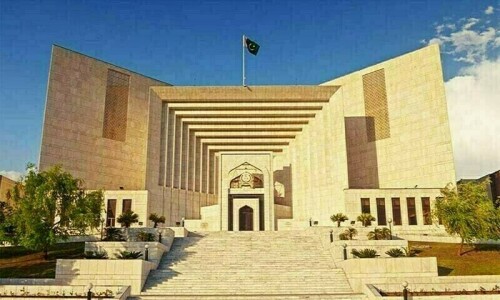US underlines Pakistan’s ‘deficiencies’ in countering terrorism
WASHINGTON: Not just the United States but others in the international community also have concerns about “Pakistan’s deficiencies” in implementing anti-money laundering and counterterrorism laws, says the US State Department.
At a Thursday afternoon news briefing, the department’s spokesperson Heather Nauert hinted that a resolution to place Pakistan on a global terror-financing watchlist had been submitted to the Financial Action Task Force (FATF). Britain, France and Germany have also endorsed this resolution, which was moved by the United States.
The remarks precede a crucial FATF meeting in Paris next week to consider new proposals for countering terrorism and money laundering.
The FATF is an international policy-making and standard-setting body dedicated to combating money laundering and terrorist financing. It maintains grey and black lists for identifying countries with weak counterterrorism mechanisms.
The watchdog does not have the powers to impose sanctions but its listing can affect international transactions as it also exposes the country dealing with a state on the watch list to greater scrutiny.
Asked if the US had moved such a resolution in the FATF, Ms Nauert said she could not confirm or deny it as FATF deliberations were “private”. But she confirmed that the international community had such concerns about Pakistan.
“Basically, the international community has this sort of longstanding concern when it comes to the government of Pakistan, about what we consider to be deficiencies in the implementation of anti-money laundering, counterterrorism, and other types of issues similar to that,” she said.
Asked if the US was satisfied with a new law that Pakistan made last week to enhance its counterterrorism capabilities, Ms Nauert said she did not have enough information about the law to comment.
The US media reported on Thursday that the Trump administration had given Pakistan a new list of a dozen top militants to detain but the document did not give their locations. “This may prevent Pakistan from taking the required action,” said a diplomatic source.
The reports also claimed that Washington has turned down Islamabad’s request for a meeting with CIA chief Mike Pompeo later this month. Pakistan had requested the meeting to discuss intelligence sharing, the reports added.
A State Department spokesperson told Dawn that Washington is also seeking more information from Pakistan about the steps it has taken to blacklist certain terrorist groups.
“The United States welcomes the steps taken to blacklist Falah-i-Insaniat Foundation (FiF) and Jamaatud Dawa (JuD) in line with UN Security Council sanctions,” said the spokesperson when asked if Washington would consider withdrawing its move to place Pakistan on the FATF watch list.
“We look forward to additional information on how these steps are being implemented and what concrete steps are being taken to counter the groups, which is crucial,” the spokesperson added.
The official also underlined the need for more specific actions from Pakistan to eliminate those terrorist groups that were using Pakistani soil to launch attacks into neighbouring countries.
“We expect to see decisive and sustainable action from Pakistan to end the ability of terrorists to operate on and conduct attacks from Pakistani soil,” the official said.
“We stand ready to work together with Pakistan to combat terrorist groups without distinction. We will continue these conversations with the Pakistani government in private,” he added.
In a separate statement to other journalists, another State Department official said that Washington had consistently expressed its long-standing concern about ongoing deficiencies in Pakistan’s implementation of its anti-money laundering/counter-terrorism finance regime.
“In addition to broader systemic concerns, this also includes Pakistan’s non-compliance with its commitments under UN Security Council Resolution 1267,” the official said.
The resolution asks member countries to freeze the assets of, prevent the entry into or transit through their territories of UN-designated terrorist groups. It also requires UN-member states to prevent the direct or indirect supply, sale and transfer of arms and military equipment to any individual or entity associated with Al Qaeda, Osama bin Laden and/or the Taliban.
Published in Dawn, February 17th, 2018

















































